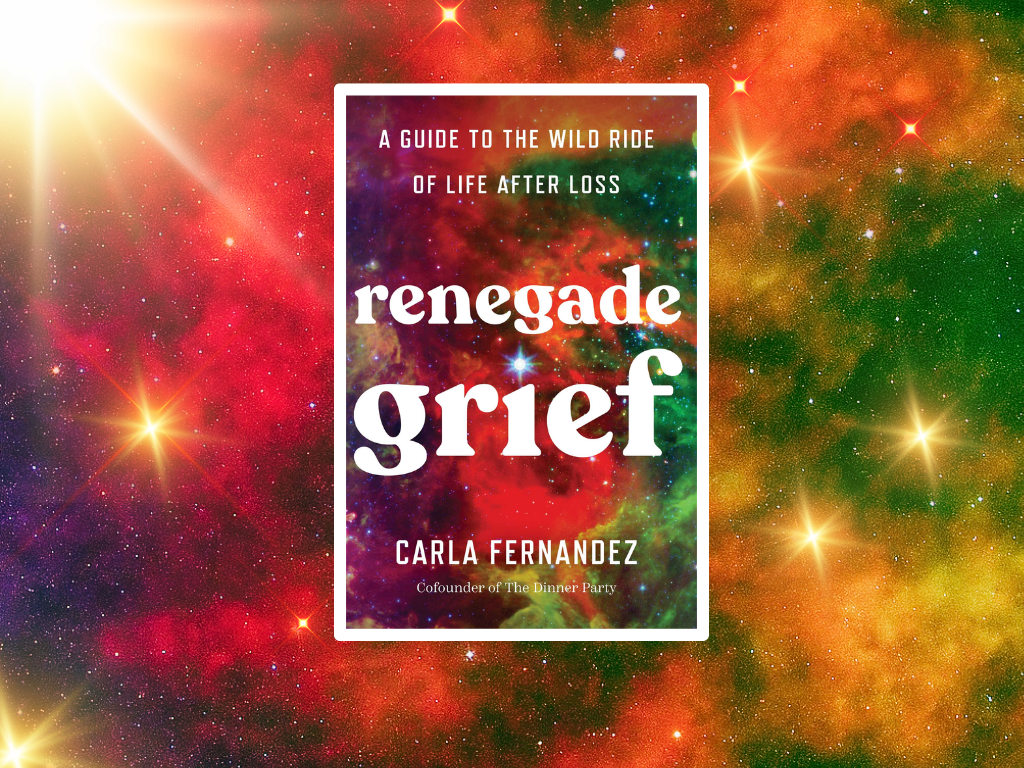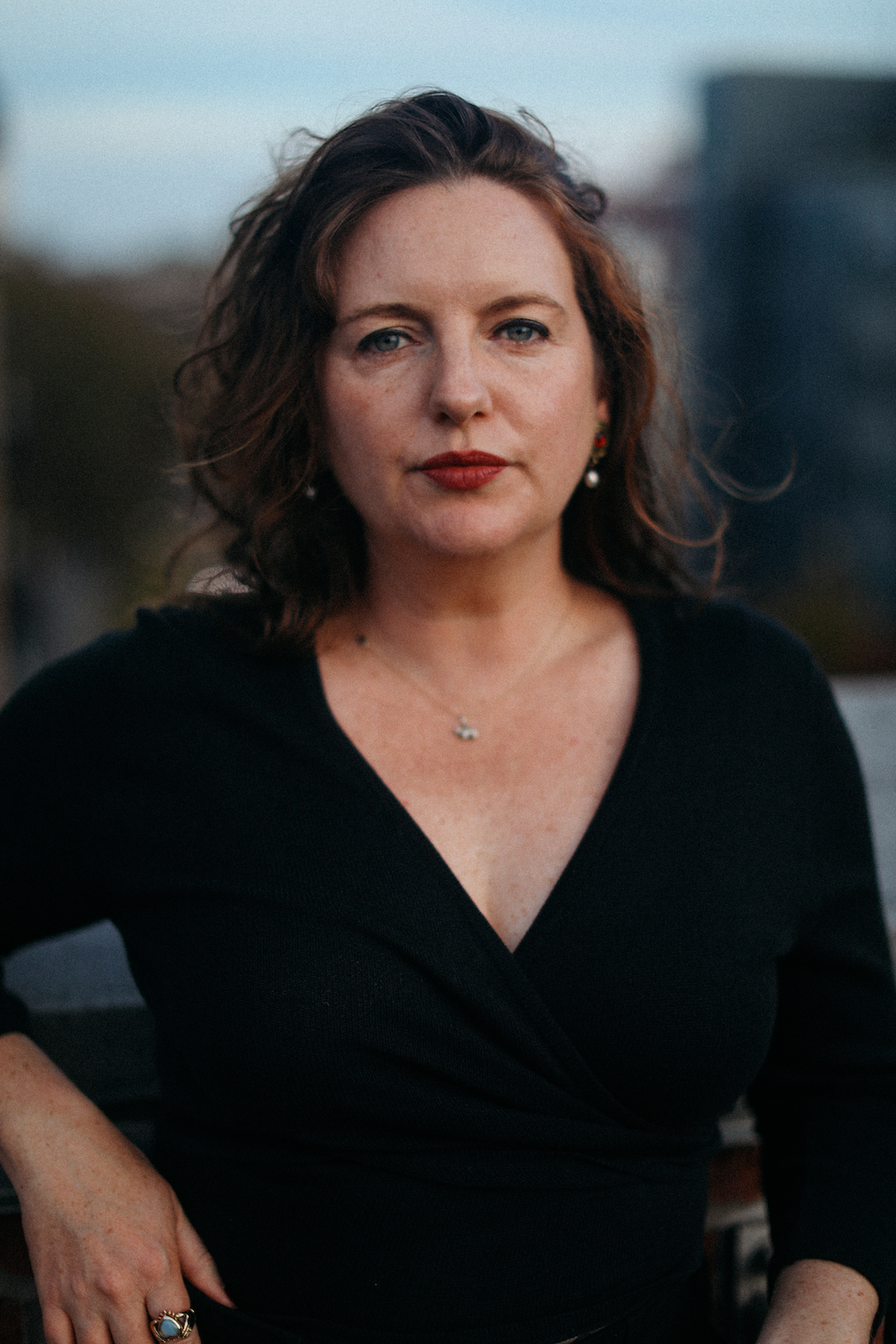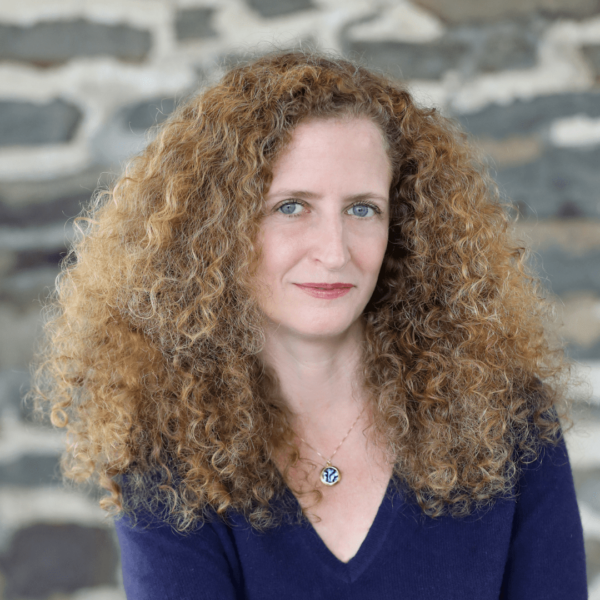
Image: SFD Media LLC
I talk to my father every day. Mostly we discuss whatever problems, small or big, are happening in my life. He usually tells me to get over it, or that it will all work out, or even that the solution will present itself when the time is right. Sometimes he tells me to down a whiskey and forget about it because that’s just the type of guy he is … or was. Oh, I forgot to mention, he died 25 years ago. I’ve been processing his death ever since. Speaking to him and listening for a response, or at least thinking about how he would respond, has always been part of my grieving process.
A Golden Opportunity for Grief Support
When Carla Fernandez, co-founder of The Dinner Party—a revolutionary organization that brings young grieving people together around a dinner table—released her new book Renegade Grief: A Guide to the Wild Ride of Life after Loss, (Simon and Schuster, March 2025), I jumped on the opportunity to chat with her. I wanted to find out what it means to be renegade in our grief, and why so many of us have a hard time holding space for our pain.
What It Means to Grieve Like a Renegade
Aileen Weintraub: Your book cracks grief wide open, and that’s so important because as a culture, we don’t really know how to grieve or how to show up for someone who’s grieving. So, what does it mean to be renegade in our grief?
Carla Fernandez: We live in a culture where, if you follow the rules and cultural norms around grief and loss, you won’t actually tend to your grief at all. To actually care for, honor, respect, and give space to your grief, you have to swim against the stream and be a little bit of an outlaw.
I think the word “renegade” often implies something like the Marlboro Man—independent, alone on a hill—but actually, being renegade in the hyper-independent culture we live in is about being more interdependent and reaching out for support. It’s about slowing down to care for our inner worlds and to pause the productivity and actually ask ourselves: How am I going to tend to myself?
Renegade Grief: Why We Lost the Plot
AW: You say in your book that we lost the plot when it comes to grief. What does that mean?
CF: I think it’s part of the shadow side of the melting pot of America and the secularization of our country. So many of us don’t have faith communities to go to, or have lost trust in them. We’re lacking the social scaffolding that other cultures and other eras have had to know what motions to move through, where to go, and how to show up for one another.
I don’t know if there ever was a golden age of grief, but certainly in this moment, as we figure out how to navigate the new world that we’re all living in post-COVID, there’s a crisis of isolation and polarization. A vacuum was created in which we lost our trust in institutions that’s now being filled by corporate wellness and pay-to-play, community care.
Underneath a lot of the agitation and discomfort and anger in our nation is unmetabolized grief, and to get to the hope and imagination and rebuilding, we have to be able to tend to the grief that’s bursting from the seams, but we don’t know how to tend to it.
I do think things are tending towards improvement, and yet I think we have more to grieve now than we ever had before with climate change, with the state of the nation, with relationships lost because of political differences. So, it feels more and more like grieving can no longer be this soft mental health issue or problem. Our ability to grieve has to be seen as a critical life skill in order to be active, awake, aware, and a present human being in the world. We have to be able to tend to the grief that we feel every day.

Image: Courtesy of Carla Fernandez
Grief Is a Life Skill—Not a Mental Health Problem
AW: How can we remain present in our grief, especially in a society that expects us to move on so quickly?
CF: There are three themes I discuss in Renegade Grief. The first is the power of peer support. This is about finding people who will witness the grief you’re experiencing. The second theme is about finding care practices that work for you so you don’t have to just grin and bear it and wait until your grief is over. We have to find ways to metabolize it, whether it’s building altars or activism. The third theme is, what does it look like to be a grief ally? So in the moments where someone tells you that they’ve experienced a loss, instead of changing the subject, you lean in and ask them about that person. Or when you know it’s the one year anniversary of someone’s grief, instead of hesitating, you just pick up the phone and call, or you send them a DoorDash gift card.
I’ve been in so many conversations with people who’ve experienced a loss that are complaining about the culture that they live in and the lack of support that they received. Unfortunately, nobody’s coming to save us. We have to be the people that are reprogramming culture, so that for the next wave of people it’s not so lonely.
When the House Goes Quiet
AW: What are some things a grieving person can do when they’re suddenly alone, when all your friends and family have left and the house is quiet, or you go to pick up the phone to call that person, and you can’t?
CF: I think that it’s up to us to resist the isolation that we currently live in and find the place for peer support that feels right for us. Chances are there’s somebody else in your phone or on your block or in your town that’s at the exact same moment of tending to their own grief, but you’d never know because it’s been normalized to avoid the subject. There’s something so powerful about realizing that. Maybe my friends who’ve never experienced the loss of a father can’t fully track what I’m going through, but what would it take for me to find somebody in my community that could?
There’s so many resources, whether it’s local grief support centers or sports teams or other things that we can join, so that we have a connection and companionship outside of the normal circles that we might move through.
Grief Lives In the Body—Here’s How to Listen
AW: Stress and trauma can have a long-lasting physical effect on our bodies. In Renegade Grief, you talk about how grief lives in the body. What does that mean?
CF: So there’s proven consistent physical reactions, physical impacts, and physical manifestations of grief. For example, people talk about having a foggy brain, people talk about impacts to appetite, to impacts to sleep and fatigue. There’s so many different ways that grief literally runs through our physical system.
So much of grief is a visceral process. In my own life, so much of my tending to grief has been getting out of my head and accepting what my body is trying to tell me.
Why Grief Is the Most Human (and Most Radical) Thing You Can Do
AW: Tell me something provocative about grief.
CF Grief is a radical act. Living in a culture that would have you be back to work in three days with no federally mandated bereavement leaves, that would have you think that it’s over in a year, that would have you think that grief is a mental health problem, as opposed to this natural, beautiful, human experience—the fact that we problematize that and pathologize it and diagnose it—I think is disappointing.
A provocative question is: What if we actually saw grief as a brutal but helpful ally in navigating life? It’s radical to give yourself space to tend to grief and to advocate that others get to do that too.
At one point during our discussion, I began tearing up and had to take a moment to compose myself. It’s safe to say that has never happened to me during an interview before. Fernandez’s positive energy and her openness to dig into the hard stuff cracked something wide open in me. She acknowledged a universal ache so many of us have secretly been holding onto. It was an important reminder that expressing grief is natural, human, and yes, renegade.
Grief Support: You’re Not Alone
If you or a loved one is grieving, you don’t have to do it alone. Here are just a few of the many resources available online.


0 Comments